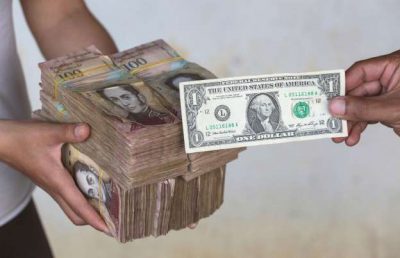Venezuela’s High Inflation Is the Country’s Achilles’ Heel – Especially in Times of Crisis

The favourable exchange rate between the US dollar and the highly inflated Venezuelan bolívar is a key element in respect of understanding why Washington has decided to behave so brazenly in instigating a ‘Twitter Coup‘ against Caracas. While the United States Federal Reserve has no qualms about printing money in order to readily monetise its own debt and otherwise help feed a ballooning federal government and associated military-industrial complex, when it comes to objectively defined hyperinflation, Venezuela’s is the worst in the world.
At the end of 2018, Venezuela’s inflation rate was 1,698,488%, making it the worst in the world by an exponential factor. By contrast, the country with the second highest inflation rate in the world, South Sudan stood at 117%. This means that in dollar-for-dollar terms, it is theoretically easier to “buy off” a Venezuelan official than any other in the world, because just about any easily convertible currency or asset in the world will go a long way in inflation rife Venezuela. Of course in reality, it appears that the vast majority of Venezuelan officials are loyal to their constitution and their constitutional defined elected President Nicolas Maduro. That being said, one does have to allow for human weakness when analysing such a situation and at the end of the day, shouting “solidarity” is free, but the temptation of a proverbial fist full of dollars (or frankly any other currency) is clearly a seductive prospect for anyone in Venezuela.
The legitimate Venezuelan government did not waste time in condemning Silva. According to the Defence Ministry in Caracas:
“To surrender to international interests is an act of treason and cowardice towards the homeland inherited from our liberator Simon Bolivar, so we reject the statements of Col. Jose Luis Silva, who had served as military attache to the United States”.
While this is clearly a robust statement, the fact remains that the current political crisis is not going to make Venezuela’s inflation woes any better and thus, the prospect of other top Venezuelan officials defecting to the pro-US self-proclaimed leader is not a conspiracy theory, but a very likely possibility over the course of the coming days and week.
First of all, the US government banned its citizens from purchasing El Petro and threatened sanctions upon non-US entities and civilians who traded in the digital but nevertheless sound currency. Secondly, as over $1.2 billion worth of Venezuelan gold is in the Bank of England, the gold has effectively been stolen from Caracas as the authorities in the The City of London have refused to allow Venezuela to withdraw its own gold from its own deposit at the UK’s central bank.
Yet instead of allowing markets rather than geopolitical mercantilism to determine policy, the US has predictably moved to strangle Venezuelan attempts to free up its own assets in order to develop something like a duel track currency model where the existing de-facto worthless bolívar might co-exist next to El Petro as well as some sort of gold backed currency.
This is of course not the first time that monetary policy among resource rich nations has led to the US taking action to undermine a UN recognised legitimate government. Prior to the 2003 war on Iraq, President Saddam Hussein dumped the petro-dollar and began trading Iraq’s oil in the then new Euro currency. Likewise, prior to the 2011 NATO invasion of Libya, the country’s revolutionary leader Muammar Gaddafi sought to put all of Africa on a gold standard as he prepared to finalise plans for a gold backed African dinar.
By contrast, if nations like Libya or Venezuela successfully adopted sound money principles, sanctions would be far less easy to enforce, whilst the domestic economies in question could thrive in a relatively inflation free environment and one in which interest rates could remain low without feeding inflation.
In this sense, while inflation had long been a problem for individual Venezuelans, now the problem is being exacerbated by the temptation that many officials will clearly have to defect to a self-proclaimed leader that is backed by the US government – which means he is also backed by a US dollar that remains stronger than Venezuela’s national currency.
*
Note to readers: please click the share buttons above. Forward this article to your email lists. Crosspost on your blog site, internet forums. etc.

